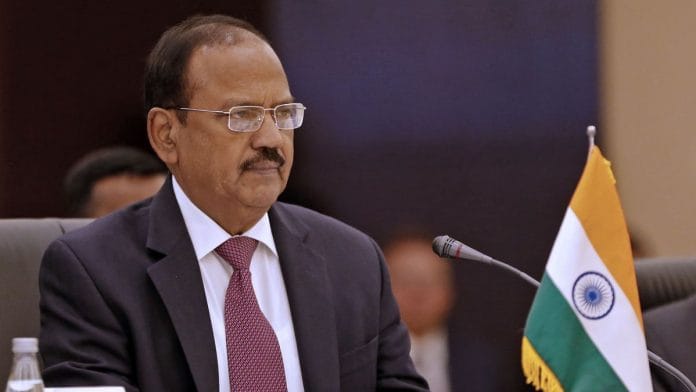At the Sardar Patel Memorial Lecture, National Security Advisor Ajit Doval says India will be compelled to take hard decisions over the next 10 years.
New Delhi: India needs a strong, stable and decisive government for the next 10 years to achieve its political, economic and strategic objectives, National Security Advisor Ajit Doval said Thursday, asserting that “weak coalitions will be bad” for the country.
Delivering the Sardar Patel Memorial Lecture here, he claimed that in the past four years, the country’s “national will” has been aroused.
Democracy is India’s strength, it needs to be preserved, Doval said while speaking on the topic “Dream India 2030 — Avoiding the pitfalls”.
“Weakened democracies can tend to make a country a soft power. India cannot afford to be a soft power for the next few years. It will be compelled to take hard decisions,” the National Security Advisor (NSA) said.
“If it becomes a soft power then you have to make compromises. And when you have to make compromises then your political survival takes precedence over the national interest,” he asserted.
Fragmented polity will make it impossible for India to realise its will because weak governments are unable to take hard decisions, the NSA said.
For taking India ahead, it will be necessary to take hard decisions, which are good for the people but are not necessarily populist, Doval said.
“India will need a strong, stable and decisive government for the next 10 years, let there be no doubt about it, to achieve our national, political, economic and strategic objectives,” he said, adding that weak coalitions will be bad for the country.
Unstable regimes are more vulnerable to fragility, corruption and local political interest taking precedence over the larger interests, he said at the event organised by All India Radio.
In his lecture, Doval cited the example of Brazil that was doing well at the global level but political instability hampered its growth.
“India cannot go for unstable coalitions,” he said.
Till 2030, India needs a decisive government and decisive leadership, he added.
He also stressed the need for adhering to the rule of law with religious commitment. – PTI







While China is a single entity so far as ethnicity language religion culture are concerned , India is a country of countries . A union of diversities . You can not equate china with India. Ajit Doval’s doctrine for development is ilboding for a democracy like india.
1984 example is 30+ years old which ran with a very much inexperienced PM. Earlier coalition govts which did deliver growth in the 1990s when simpler reforms fetched good growth. In 2000s and 2010s tough reforms are reqd and we know how the growth slowed down during UPA which didn’t undertake major reforms.
India has learnt to live with coalitions, some have delivered reforms and higher economic growth. There is little empirical evidence to suggest a measurable coefficient between numbers in the Lok Sabha and national achievement, the mammoth 400 plus figure of 1984 being a classic example. Whatever the composition of the federal government, a conscious effort will have to be made to forge a deeper multiparty consensus on matters pertaining to national security, especially foreign policy, which was earlier the norm. The other vital ingredient for hard power, however defined, is high economic growth, without too much inequality. That is where China has stolen a march over so many others.